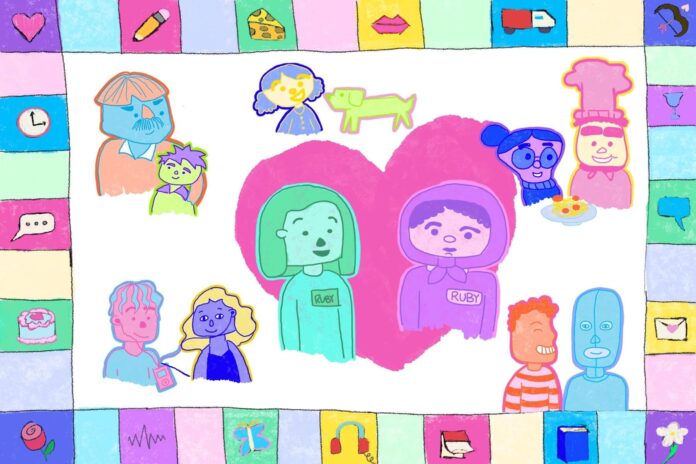I have exactly one photo of Ruby Gower. In it she is wearing a pink blouse, a flower tucked into the breast pocket. She’s staring at the camera with an expression I read differently every time I look at it. Ruby Gower died in 2018 in Tahlequah, Oklahoma, where she was born. She was 92. She made good plum jelly and loved Elvis. She is survived by an adoring family.
I should confess that I’ve never met Ruby — I know about the plum jelly and the Elvis sing-a-longs from her one-paragraph obituary, one of thousands of others on the Dignity Memorial website. Reading her obituary has, in some weird way, helped me come to terms with my own mortality. The words “Ruby Gower died,” printed starkly on the page, followed with descriptions of how much she was loved, makes me feel like my inevitable death is something less awful and shrouded in mystery.
I’ve never told anyone about my fascination with Ruby Gower; I never thought anybody would understand. So imagine my surprise when, browsing the New York Times’ Modern Love page, I stumbled across an article entitled “Jennifer Graham likes Jennifer Graham.”
The article tells the story of, yes, Jennifer Graham, who met a woman online, also named Jennifer Graham. They developed a short-lasting, but deep relationship that left the former Jennifer with many regrets, having never visited the latter Jennifer in person before she died.
Their story has some glaring differences from mine and the late Ruby Gower’s, the most obvious one being that both Jennifers actually knew each other. But still, it illustrates for me one of the best things about human relationships — how they often form spontaneously, from the most fragile points of connection. My mum would play the Modern Love podcast in the car during long drives, and I’d usually roll my eyes: I found it corny, too long, too short, too annoying or not annoying enough (I was 15). But most importantly, I was into serious love stories — with tearful breakups and crescendo endings. But as I began to think about my own relationships and the relationships I saw around me, I began to understand exactly why Modern Love is so perfect.
In February 2023, I started working for an elderly woman, Fiona*. I was hired to organize all of her old letters, which numbered in the hundreds. We would sit together and go through these pieces of her life while she told me what it was like to protest apartheid in her native South Africa and how she felt about artificial intelligence. I watched her inch closer and closer to death throughout the three months I knew her. I often cried at the end of our sessions, and she would tell me not to. That May, the week before she died, when she couldn’t get out of bed, she told me to go to Occidental for college. The next day, I made the decision to go. A few days later, I saw her obituary in the newspaper.
I’d only known Fiona for three months, but she shaped my life in ways I don’t see represented in typical relationship columns, which often focus around dating. My relationship with Fiona heightened my appreciation for Modern Love — it affected me as deeply as any romantic relationship, and had a disproportionately large impact on my life for such a short period of time. Modern Love shows us that the most impactful relationships in our lives are often the ones we didn’t see coming.
Some may argue that taking long, expansive love stories and condensing them into short articles — or even 100 word paragraphs, as in the case of Tiny Love Stories — robs them of their nuance and complexity. Many times, when I’m reading a jokey story about a bad date, I think of the person being written about, wanting to put themselves out there, only to be immortalized in a 100-word paragraph as the really smelly guy somebody from Fort Lauderdale went out with.
However, I understand each Modern Love article as less of a plot-driven story and more of an expression of the age-old idea that love comes from everywhere, if you have the eyes to see it. Keeping the entries short and sweet cuts to the heart of this idea and allows us more easily to see the similarities between seemingly different forms of love. The love between a man wearing a latex suit to look white and his rubberist boyfriend might seem light years away from the love between a child and their parent with dementia if each writer explained to us their stories in full detail. But kept short, it’s revealed that certain elements: love, sacrifice and oddity that springs from two people loving each other, are the same across every type of relationship imaginable.
A lot of this probably seems naive. Modern Love has been around since 2004, after all; people have known about it and how good it is for a long time. But growing to love it, and growing to love the nontraditional forms of love in my life — mentors, childhood best friends and Ruby Gower from Tahlequah — has been one of the best journeys of my life. If there’s anything I’ve learned from Modern Love, it’s that real life rarely has big, tearjerker endings. But I think we should try to see more love in one another. It’s all around us, after all.
*Fiona is a pseudonym for privacy reasons.
Contact Ruby Gower at gower@oxy.edu.
![]()































